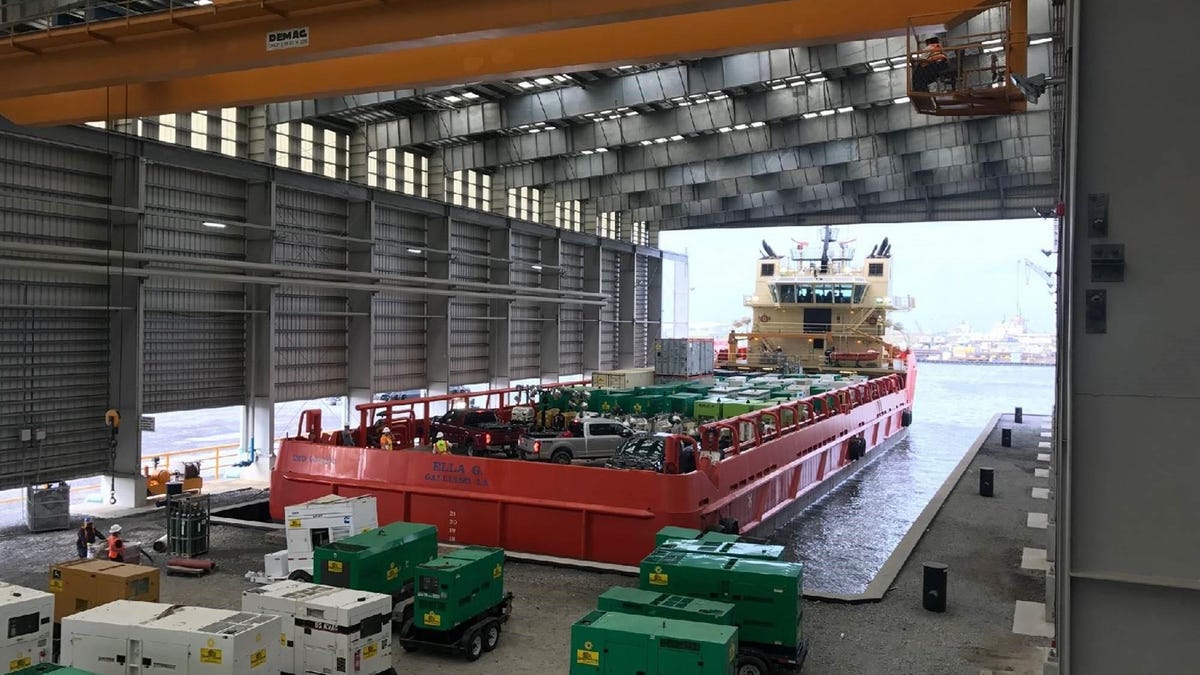Feds front $77 million to restore phone service in Caribbean
US regulators and large wireless carriers are offering help to get communications networks restored on Puerto Rico and the US Virgin Islands.

T-Mobile sends additional equipment and supplies to Puerto Rico to help with Hurricane Maria recovery efforts.
The Federal Communications Commission is kicking in money to help restore badly battered phone service on Puerto Rico and the US Virgin Islands.
The agency voted Wednesday to provide up to $76.9 million in Universal Service Fund money to help wireless carriers restore service. The FCC unanimously voted to provide the funds immediately to carriers. It also promised up to seven months of support from the fund, which has been used for decades to help lower the cost of deploying service in areas that are expensive to serve.
Typically, companies that qualify for Universal Service Funds get money to subsidize the cost of delivering their service every month. The lump sum payment will be used to begin the work of repairing infrastructure that was devastated as a result of Hurricane Maria, which hit the islands on Sept. 20, taking down most of the cell sites and leaving people without wireless, cable or even wireline phone service.
As of Thursday, 84.6 percent of cell sites on Puerto Rico and 60.3 percent on the US Virgin Islands were still not functioning, according to the FCC (PDF).
"The devastation wrought by Maria in Puerto Rico and the US Virgin Islands requires us to think more creatively," FCC Chairman Ajit Pai said in a blog post. Pai added he hoped this nearly $77 million would be a "shot in the arm for network recovery and reconstruction" and give companies "the flexibility they need to restore service as quickly and efficiently as possible."
Flooded roads, cut fiber lines and a lack of commercial power have been among the biggest obstacles to restoring service, cell phone companies have said. Even though companies that qualify for USF funding are generally smaller regional players, the influx of cash could also help larger firms that don't qualify for these funds, like AT&T, T-Mobile and Sprint, get back online more quickly, said Sarah Oh, a research fellow and economist with the Tech Policy Institute think tank.
"The fixed infrastructure repairs will support efforts by all carriers in those areas," Oh said. "This lump sum funding support can go toward rebuilding infrastructure, such as cell towers, and restoring and repairing commercial power to these sites."
AT&T said in a statement that it appreciates the FCC's "efforts to facilitate rebuilding the communications infrastructure in Puerto Rico and the US Virgin Islands." The company said it will "closely assess the details of the Chairman's proposal" as AT&T continues its recovery efforts.
As ports have opened and roadways have been cleared, AT&T, T-Mobile and Sprint have been sending equipment, supplies and personnel to help get their networks functioning again. Verizon doesn't offer service on Puerto Rico. AT&T said it's been connecting more than 9 million calls and 5 million text messages a day on its network in Puerto Rico.
The company said a military flight arrived earlier this week in San Juan with temporary cell sites, generators, fleet vehicles, and network equipment and supplies. Additional assets have continued to arrive on the island through the week.
AT&T also said it's made steady progress in deploying equipment and restoring service to sites on St. Croix, and crews will be deploying to St. John to deliver and set up equipment.
Sprint and T-Mobile have also been sending supplies and personnel to Puerto Rico. T-Mobile said it sent two barges loaded with additional trucks, temporary cell sites, and fuel.
But they all acknowledge it will be a long time before service is restored 100 percent throughout the region.
T-Mobile's chief technology officer, Neville Ray, tweeted earlier this week that "conditions remain perilous. Recovery will be a long, hard road, but our US & Puerto Rico teams are fully committed to relief efforts there."
The Smartest Stuff: Innovators are thinking up new ways to make you, and the things around you, smarter.
Life, Disrupted: In Europe, millions of refugees are still searching for a safe place to settle. Tech should be part of the solution. But is it?

